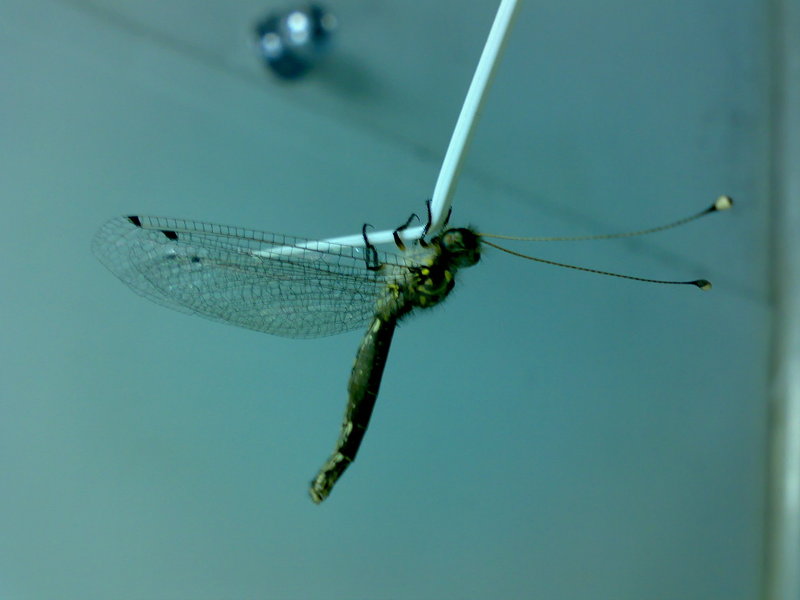Owlfly
From Wikipedia, the free encyclopedia
[Photo] Owlflies maybe seen seeking bright lights at night. Source: picture taken by Jherskie using a Nokia N73 celphone. Date: 18 March 2007
Owlflies are dragonfly-like insects with large bulging eyes and long knobbed antennae. They are not true flies, but rather neuropterans in the family Ascalaphidae, and as such are more closely related to beetles.
Owlflies are readily distinguished from dragonflies because the latter have short bristle-like antennae.
The closely related ant-lions, family Myrmeleontidae, have short, clubbed antennae, smaller eyes, and very different wing venation. The sole member of the subfamily Albardiinae, the Brazilian Albardia furcata, also has short, clubbed antennae but has typical reticulate Ascalaphid venation.
Adult owlflies are aerial predators feeding on other insects. When disturbed, some owlflies will release a strong, musk-like, chemical to deter an enemy. Adults of many New World species are most active at sunset and dawn and can often be collected around lights. During the day, such adults rest on stems and twigs with the body, legs, and antennae pressed to the stem. The abdomen in a few species is held up, projecting into the air, to look like a broken twig. Many Old World species, however, are most active during the day, and are brightly colored - many even hold their wings spread at rest like dragonflies. Most owlflies average about 2 inches in length. Adult Ululodes have large divided eyes, which is where the common name "Owlfly" came from, in addition to their crepuscular habits. Owlflies are worldwide in distribution, though in North America they are primarily southerly.
Life cycle
Eggs are laid on twigs or under stones. Larvae are predatory, and lie on the ground or in vegetation, covered with debris, waiting for prey. Larvae resemble those of ant-lions, but have a "finger-like appendage" on the side of each segment. Some genera actively cement sand and debris onto their bodies as camouflage. Pupation occurs in a spheroidal silk cocoon in leaf litter.
http://en.wikipedia.org/wiki/Owlfly
| The text in this page is based on the copyrighted Wikipedia article shown in above URL. It is used under the GNU Free Documentation License. You may redistribute it, verbatim or modified, providing that you comply with the terms of the GFDL. |
|

